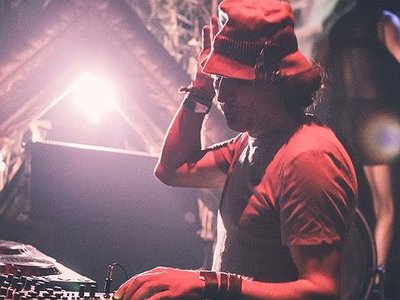Collaborations can take on many forms. What role do they play in your approach and what are your preferred ways of engaging with other creatives through, for example, file sharing, jamming or just talking about ideas?
My only way of producing music is engaging other musicians and being with them in the studio, trying things out and creating.
Take us through a day in your life, from a possible morning routine through to your work, please. Do you have a fixed schedule? How do music and other aspects of your life feed back into each other - do you separate them or instead try to make them blend seamlessly?
I am a hyperactive person so it’s hard for me to be in one place for a long time. This includes studios too. I start my day with a cup of black tea. I spend time with my children and the rest is unclear. It can be an observing or listening day or a day to spend some hours in the studio to try out what is in my mind. I enjoy it this way.
Can you talk about a breakthrough work, event or performance in your career? Why does it feel special to you? When, why and how did you start working on it, what were some of the motivations and ideas behind it?
I believe it was one of my very first performances that had the biggest influence on me and let me continue my musical career. I was on the stage with three incredibly good instrumentalists and I will never forget the excitement and happiness of the audience.
There are many descriptions of the ideal state of mind for being creative. What is it like for you? What supports this ideal state of mind and what are distractions? Are there strategies to enter into this state more easily?
As I mentioned before I am a hyperactive person so distractions feed me. I cannot say I have an ideal state of mind that allows me to create my music. I would rather say ecstasy, chaos and distractions make me creative.
Music and sounds can heal, but they can also hurt. Do you personally have experiences with either or both of these? Where do you personally see the biggest need and potential for music as a tool for healing?
Even if I cannot travel, my music travels the world and meets people and finds its way into their life, celebrations and gatherings or accompanies them when they want to be alone or when they are alone. My music is my astral journey that heals me.
There is a fine line between cultural exchange and appropriation. What are your thoughts on the limits of copying, using cultural signs and symbols and the cultural/social/gender specificity of art?
Whatever I produce is my music. I am influenced by many ethnic groups and working with artists from different parts of the world. The key is to never forget to give credit and respect.
Our sense of hearing shares intriguing connections to other senses. From your experience, what are some of the most inspiring overlaps between different senses - and what do they tell us about the way our senses work?
I believe one can overlap even five senses with music. For me, seeing something and hearing music at the same time can change many things, even the colors of a thing that I am looking at. Or hearing music and touching something at the same time can give me a different feeling.
Art can be a purpose in its own right, but it can also directly feed back into everyday life, take on a social and political role and lead to more engagement. Can you describe your approach to art and being an artist?
Big words are coming. My opinion is that art should convey morals or messages. My music is a reflection of me having an immigrant background and growing up together with minorities etc. I carry those sounds that I learned when I was a kid into my music. Music is a way for me to not only express myself but also to express what is around me. And I cannot close my eyes and say my music is not political.
What can music express about life and death which words alone may not?
Peaceful immorality. Societies can be oppressed by politics or the languages can be forbidden but rhythms and music remain.


